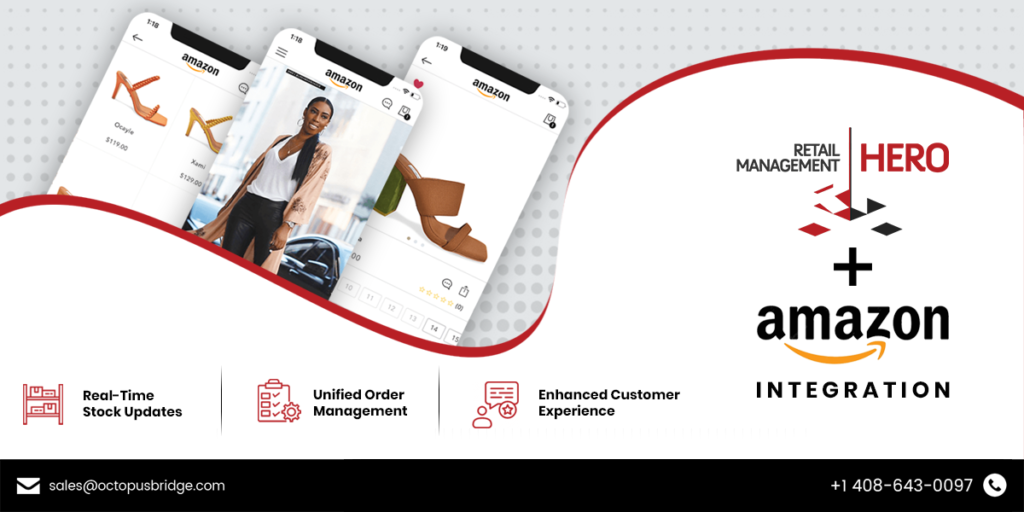In the picturesque coastal town of Portland, Maine, a fishing gear store has long been a favorite destination for local anglers and tourists alike. Offering a wide range of products, from high-quality fishing rods and reels to specialized bait and tackle, the store has built a reputation for its expertise in all things related to fishing. The store’s knowledgeable staff, commitment to sourcing the best gear, and dedication to customer service have made it a trusted resource for both novice and experienced anglers. However, as the store sought to expand its reach through online sales, it faced the challenge of managing inventory across its physical location and the Amazon marketplace.
The store had been using Retail Management Hero (RMH) as its in-store point-of-sale (POS) system for years. RMH efficiently managed the complexities of tracking inventory for a wide range of products, from small accessories to large fishing equipment. However, as the store’s online presence grew, particularly on Amazon, the need for a more integrated approach to inventory management became apparent. Without an integrated system, the store began to experience issues such as discrepancies between in-store and online stock levels, leading to situations where customers would order products on Amazon that were no longer available in the physical store.
To address these challenges, the store’s management decided to integrate their RMH POS system with Amazon using Octopus Bridge, a cloud-based middleware solution offered by 24Seven Commerce. Octopus Bridge was designed to synchronize inventory, pricing, and product information between RMH and various eCommerce platforms, including Amazon, ensuring that both the physical store and the online marketplace were always in sync.
The integration process began with setting up Octopus Bridge to connect RMH and Amazon, enabling near real-time updates to inventory levels and prices whenever a sale occurred. The process required the store to first create product listings on Amazon, as the marketplace has specific requirements for product information. Once the items were listed, the integration would take over, automatically updating stock levels and prices based on transactions in either the physical store or on Amazon.
For example, if a customer purchased a top-of-the-line fishing rod in the store, the RMH system would immediately communicate with Amazon via Octopus Bridge to update the online inventory, ensuring that the product was no longer available on Amazon if it was the last one in stock. Conversely, if an online customer purchased a set of specialized lures on Amazon, the integration would instantly deduct that item from the in-store inventory, preventing it from being sold to another customer who might walk into the store looking for the same item.
One of the most significant benefits of this integration was the elimination of manual inventory updates, which had previously been a time-consuming and error-prone process. With Octopus Bridge handling the synchronization automatically, the store’s staff could focus more on providing expert advice and personalized service to their customers, both in-store and online. This also meant that customers on Amazon always had access to accurate information about product availability, which enhanced their shopping experience and reduced the likelihood of order cancellations or negative reviews due to stockouts.
In addition to inventory synchronization, the RMH-Amazon integration streamlined the process of managing product listings. The store frequently updated product descriptions, introduced new items, and adjusted prices based on seasonal demand or special promotions. With the integration in place, these updates could be made in the RMH system and instantly reflected on Amazon. This consistency across channels not only saved time but also reinforced the store’s reputation for reliability and customer-centric service.
The integration also provided the store with valuable insights into its sales performance across both physical and online channels. By analyzing data from RMH and Amazon, the store’s management could identify trends, such as which products were most popular online versus in-store, and adjust their inventory and marketing strategies accordingly. This data-driven approach allowed the store to optimize its product offerings and promotions, ultimately driving higher sales and customer satisfaction.
As a result of these operational improvements, the fishing gear store saw a significant increase in online sales through Amazon, which complemented its already strong in-store performance. The ability to maintain consistent inventory levels and pricing across all channels allowed the store to confidently expand its online presence, knowing that it could continue to provide the same level of quality and service that had made it a trusted resource for anglers in the region.
In conclusion, the RMH and Amazon integration, facilitated by Octopus Bridge, was instrumental in the fishing gear store’s continued success. By automating inventory management, streamlining product updates, and providing valuable sales insights, the integration allowed the store to thrive in a competitive market. Whether customers were shopping for high-end fishing equipment, specialized bait, or essential accessories, they could always rely on this fishing gear store to deliver an exceptional experience, both in-store and online.


